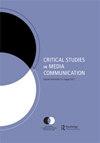Review of LGBTQ Visibility, Media and Sexuality in Ireland
IF 1.5
2区 文学
Q3 COMMUNICATION
引用次数: 0
Abstract
deconstruction of sexuality, race, and gender and the rise of reality television. She maintains that reality television evolved to feed a consumer culture in which societal taboos are set aside in favor of selling sex and violence. Dedicating an entire chapter to reality television meeting reality, Bordo traces reality television’s evolution from documentary-style programming to the current bombastic, violent, and sex-fueled programming, characteristics also representative of Trumpism. Within this context, Trump became the U.S.’s first reality television President. In response, Bordo quips, “It’s left to the fictional side of television to adequately represent our reality— which ironically doesn’t feel like reality anymore at all” (p. 132). This statement is significant given the notable disconnect from reality that was at one time prevalent on U.S. television. For example, with its idyllic settings, lack of diversity, and reinforcement of the patriarchy, 1950s and 1960s television sitcoms contradicted a social context that included the Civil Rights and Women’s Movements and Vietnam War. For those who grew up during the golden age of television (1948–1959) and/or study television, TV (Object Lessons) will be an enjoyable and valuable read. Readers in the first category might revel in revisiting the programming of their youth, while researchers and academics might find the brief history of television in the U.S. useful. As a self-described popular culture fiend who dedicated her life to the field, Bordo adeptly weaves together the stories of how television evolved, changed the country’s social and cultural norms, and gave rise to Trump. Through TV (Object Lessons), Bordo’s long relationship with television offers insight into the current political climate in the U.S. However, as one person’s experience with television, this book does not serve as (nor is it intended to be) a robust or scholarly account of the media.爱尔兰LGBTQ的能见度、媒体和性行为回顾
性、种族和性别的解构以及真人秀电视的兴起。她坚持认为,真人秀节目的发展是为了满足一种消费文化,在这种文化中,社会禁忌被搁置一边,而倾向于出售性和暴力。博尔多用了整整一章来描述真人秀节目与现实的相遇,他追溯了真人秀节目从纪录片风格的节目到现在夸夸其词、暴力和色情的节目的演变,这些节目的特点也是特朗普主义的代表。在这种背景下,特朗普成为了美国第一位真人秀总统。作为回应,博尔多打趣道,“这是留给电视虚构的一面来充分代表我们的现实——讽刺的是,这一点也不像现实了”(第132页)。鉴于美国电视一度普遍与现实脱节,这一声明意义重大。例如,20世纪50年代和60年代的电视情景喜剧,其田园诗般的背景,缺乏多样性和父权制的强化,与包括民权和妇女运动以及越南战争在内的社会背景相矛盾。对于那些在电视黄金时代(1948-1959)长大和/或研究电视的人来说,电视(对象课程)将是一本令人愉快和有价值的读物。第一类的读者可能会陶醉于重温他们年轻时的节目,而研究人员和学者可能会发现美国电视的简史很有用。博尔多自称是一个流行文化迷,她把自己的一生都奉献给了这个领域。她熟练地将电视是如何演变的故事编织在一起,改变了这个国家的社会和文化规范,并催生了特朗普。通过电视(Object Lessons), Bordo与电视的长期关系提供了对美国当前政治气候的洞察。然而,作为一个人与电视的经历,这本书并不是(也不打算是)对媒体的有力或学术描述。
本文章由计算机程序翻译,如有差异,请以英文原文为准。
求助全文
约1分钟内获得全文
求助全文
来源期刊

Critical Studies in Media Communication
COMMUNICATION-
CiteScore
2.10
自引率
0.00%
发文量
34
期刊介绍:
Critical Studies in Media Communication (CSMC) is a peer-reviewed publication of the National Communication Association. CSMC publishes original scholarship in mediated and mass communication from a cultural studies and/or critical perspective. It particularly welcomes submissions that enrich debates among various critical traditions, methodological and analytical approaches, and theoretical standpoints. CSMC takes an inclusive view of media and welcomes scholarship on topics such as • media audiences • representations • institutions • digital technologies • social media • gaming • professional practices and ethics • production studies • media history • political economy. CSMC publishes scholarship about media audiences, representations, institutions, technologies, and professional practices. It includes work in history, political economy, critical philosophy, race and feminist theorizing, rhetorical and media criticism, and literary theory. It takes an inclusive view of media, including newspapers, magazines and other forms of print, cable, radio, television, film, and new media technologies such as the Internet.
 求助内容:
求助内容: 应助结果提醒方式:
应助结果提醒方式:


